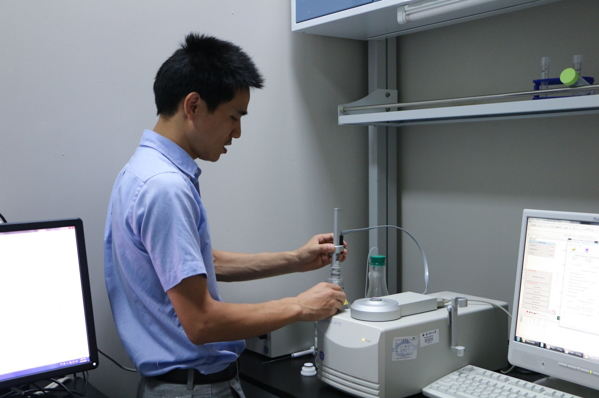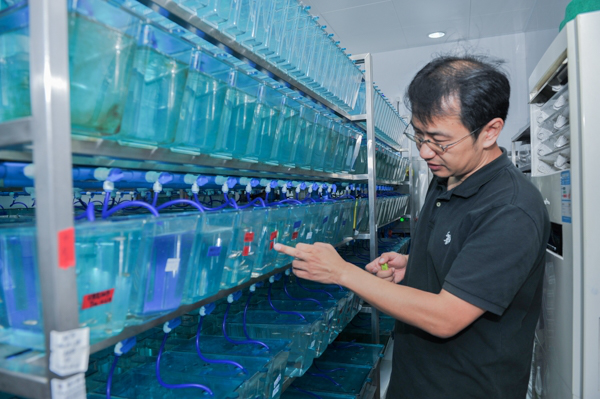Summer is a season full of vitality and vigor. In the morning, sunlight penetrates exuberant leaves and sprinkles on the tip of the grass, breaking the silence of the world. People in the city go to work; Children enjoy their holidays and play in the parks. At SUSTech, there is a group of people doing experiments in labs with curiosity and enthusiasm towards life. They discover the treasure and wonders of life. Our Students News reporter met with some of them to have a taste of the adventures they embark on everyday.
Freshmen: Explore the “Fantastic Reactions”
Entering the lab of Department of Biology, the reporter was attracted by the complex equipment and colorful reagents, while the students were busy doing experiments.
“The students here work very hard, most of them in the lab were freshmen. Owing to their love for biology, they took part in the summer course of biological experiments. These students could do many experiments which are usually reserved to postgraduates in other universities. At first, they were so amazed by the fantastic reactions and results of their various experiments that they forgot what to do next. I kept reminding them, and now they behave really professionally. They come to the lab very early, clean the lab, do experiments carefully and leave the lab late at night.” Cui Jiesheng said of the students, a researcher in the Department of Biology labs.
Cheng Yuan, a student of 2015, is one of the students mentioned by Cui. “He worked very hard,” He said: “I get to the lab between 7:30 and 8:00 in the morning. At first, I would not leave the lab until one or two o’clock at night. However, as I was more familiar with doing experiments, I could leave the lab earlier, at 12 or one o’clock at night.” Although Cheng Yuan was busy with his study, he looked energetic. He also learned a lot from the summer course in the past half one month. He joined one group meeting in the lab, presented one academic report, had a good command of the usage of instruments such as flow cytometer and cell counter, and became familiar with basic process of doing experiment. “What I am doing now is to use a circuit to control the frequency of the on and off of the light source, so as to measure its effect on the specific gene expression of cells in a quantitative way. He said earnestly: “at the beginning, I needed to stand several hours to assemble spear heads for the experiment, which was quite tiring. Now everything is on
“Even if I may not choose biology as my major, I am interested in biology. Why not learn it conscientiously? I am tired, but I am also very happy.”

Dr. Xie Xingqiao: Look for Stories in Protein
Usually, I get up at 8:30 in the morning and sleep at 10:00 at night. Sometimes I sleep at 11:00 when there is much work to do.” Xie Xingqiao, a post doctor, joined in the research group in SUSTech one year ago.
Different research groups of biology in the No.1 Research Building focus on different fields, and all professors have different research interests. For example, the research group led by Prof. Yu Cong primarily studies cell migration, the structure and function of polarized cell, and the interaction between proteins. Dr. Xie said, the difficulty in finding new interaction between proteins is protein structure analysis. As famous biologist Prof. Shi Yigong said: “your story can get started if you can analyze the protein structure.”
“Sadly, my story doesn’t really get started. It stops short with only a prelude” Dr. Xie said with a smile. He added that it is natural that there is a great difference between the actual work in the lab and theories in books. Doing experiment in a lab is to train students to put what they learn from books into practice. It is also vital to tell students that an experiment do not always a success. Therefore, doing experiment calls for a positive attitude. In addition, a solid foundation of professional knowledge and experimental operation skills is also important. What’s more, students need to learn how to cooperate with others.
When the reporter left the lab, Dr. Xie threw himself into protein analysis again, looking for his story. We sincerely expect that Dr. Xie and every researcher in SUSTech can find their own beautiful stories on campus.

Assistant Professor Zhong Hanbing: “the Zebrafish Prince”
Assistant professor Zhong Hanbing is named “the zebrafish prince” by his colleagues. His research group uses the growth pattern of zebrafish to study the development of endoderm organs and the neurodegenerative disease. In his lab, you can see many zebrafish are swimming in the fish bowls. He said that zebrafish needed good water temperature control and diet control, which could ensure the accuracy of experiments.
“By researching zebrafish, we want to provide some clues for the regeneration of mammal’s organs. For instance, in China, people live with liver illnesses tend to suffer from liver cirrhosis in advanced stage. Therefore, the liver regeneration is in great demand.” Prof. Zhong expressed that current research should focus on social demands and combine both together.
“The research requires that the participants and post-graduates should discover or propose a scientific question and answer it based on their knowledge structures.” When asked about the qualities of a researcher, he answered. Besides, prof. Zhong told the journalist that zebrafish is an integrated pattern. Sometimes an unexpected phenotype is joyful. But it is boring in the lab for most of the time. For example, we all think Mendel’s discovery is wonderful, but planting peas is a hard job.
“I truly welcome students to visit the lab and find out if are you really want to take the road of biological research. At the same time, you should broaden your horizon, care about the society and participate in the social affairs.”
Associate Professor Wei Zhiyi: Appreciate the Microcosmic Beauty of Life
The visit to Prof. Wei’s lab was taken during the break time at noon; however, some people were still busy walking around the tables, which were occupied by instruments and reagents. Researchers were carefully taking culture from the Escherichia coli culture dishes and preparing for the next experiment. “The research group is very busy; sometimes we need to work late into the night.” Prof. Wei said, “But there are always some worthy surprises in this process.”
Prof. Wei’s research group researches the neurodevelopmental mechanism, the assembly mechanism and the target identification mechanism of major functional protein molecular machines, with the studying of the molecular structure of protein as the main method. Our experiments focus on micro-molecule, so they don’t seem cutting-edge. But by deepening the research of basic mechanism, we can see how great the nature is. We can never work out how protein works. It is amazing!” Prof. Wei said.
However, the greatness of life comes from its complicated and delicate mechanisms.
“Surprises emerge every day. An organism is complicated, and so many things are unknown. We cannot predict everything successfully. So, you need to be ready for all kinds of experiment results. Failure happens, only with persistence you can lead to the end.”
“Besides an interest in biology, you should also appreciate the beauty of life. No matter in doing experiments or studying, it’s very important to be open-minded, curious and to accept your mistakes.” Prof. Wei said, “To be open-minded means you need to accept different kinds of experiment results and to learn more about other disciplines. Interdisciplinary study is important, because you might get inspiration in other disciplines. Curiosity and the spirit of exploring the unknown are prerequisites for a researcher. Modesty is also required. Considering there are so much unknown things to explore, it must be a long journey, and we must keep learning.”
One experiment table, one pipettor, two hands, a pair of devoted eyes…The lab in SUSTech is the entrance of a journey to discover the mystery of life. Students and researchers, cherishing curiosity and awe towards life, experience the joy of experiments. They sing a song of unique exploration with their hands and youth.
Proofread By
Photo By